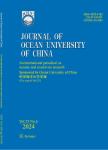Impacts of Coagulation Pretreatment on MF Filtration and a Comparative Study of Different Membrane Module Types
Impacts of Coagulation Pretreatment on MF Filtration and a Comparative Study of Different Membrane Module Types作者机构:Department of Civil Engineering Kyungnam University Masan 631701 Korea Water Environment & Remediation Research Center Korea Institute of Science and Technology Seoul 136971 Korea
出 版 物:《Journal of Ocean University of China》 (中国海洋大学学报(英文版))
年 卷 期:2006年第5卷第4期
页 面:295-299页
主 题:coagulation pretreatment rationale fouling submerged module pressured module
摘 要:Changes in the regulatory requirements and the forthcoming Disinfectant/Disinfection By-Products (D/DBP) Rule will require that drinking water treatment facilities be operated to achieve maximum removals of particles and disinfectant tolerant microorganisms as well as natural organic matter (NOM). For drinking water production, the use of membrane filtration processes such as microfiltration and ultrafiltration (MF/UF) alone to satisfy the turbidity, particle and microorganism removal a requirement of the surface water treatment regulation (SWTR) is not enough. MF/UF treatment processes can achieve only nominal (10 percent) removal of disinfection by-products (DBP) precursors (James, et al., 1995). On the other hand, too fast fouling can make the filtration processes more difficult to carry on. To solve these problems, many authors have been interested in installing coagulation pretreatment before membrane filtration to improve membrane performance. However, previous studies reported conflicting results. Some supported the effectiveness of coagulation pretreatment, while others contended that coagulation aggravated membrane performance. This research aims to identify the effects of coagulation pretreatment on membrane filtration through a pilot study using PVDF membrane in combination with analyzing the rationale of coagulation. Another objective of this research was to evaluate the different impacts on membrane performance of using different membrane modules (the submerged module and pressured module). The results showed that coagulation pretreatment greatly improved the membrane performance, extending the filtration time as well as reducing the permeated organic level, and that the submerged module is much more efficient than the pressured module.



